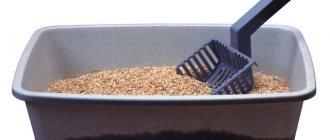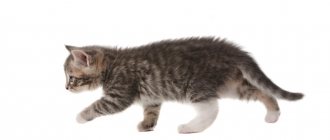Why does the cat piss everywhere?
Before you wean your cat from relieving itself anywhere, you should understand the reason. It could be:
- The pet is not spayed/sterilized. Due to natural instincts, animals can begin to mark their territory. More often this applies to cats, but you can also find a female doing this. After such operations, the pet loses this habit and its behavior changes.
- Incorrect tray or litter. Sometimes the cause is an inconvenient tray. You need to choose a convenient place where the animal will relieve itself. It is necessary to select a good litter and clean the cat litter regularly.
- Health problems. One of the reasons may be disturbances in the functioning of the body. If your pet has not previously caused problems in this regard, take him to a specialist.
- Revenge. As you know, cats have a complex character and are quite difficult to tame. If you scolded or offended your pet, the usual dirty trick is an act of protest in your direction.
- Instincts. Sometimes, a mustachioed friend may begin to spoil your things not on purpose, but only because these items smell the same as the tray.
Kitty
Removing Cat Urine Smell from Carpet
Getting rid of cat urine odor from carpet can be difficult because it can penetrate through the carpet fibers and into the carpet pad. And since cats have a strong sense of smell, it's important to thoroughly clean and deodorize the area to prevent a repeat visit!
To make it yourself: Rub the area thoroughly with baking soda and let dry. Then sprinkle with baking soda. Wait for the baking soda to absorb any remaining odor and then vacuum.
Popular and Inexpensive Cat Urine Odor Removers
What to do if your cat goes on the bed
First, it is worth identifying the motives why the cat does such things. She may show jealousy towards another animal, mark or take revenge. Depending on the cause, measures to combat them will be selected.
- Pay more attention. Sometimes the animal begins to show attention to itself in this way, and the bed is one of the fastest and most effective ways.
- Mark the territory. Sterilization or castration of the animal can help with this problem.
- Use strong scents to repel the animal. For example, you can choose citrus or lavender.
- Close the bedroom door. Of course, this may start to make furry angry, but it is better to sleep in a clean bed.
Removing cat urine odor from bedding and clothing.
Although it may seem like a vicious insult, a cat spraying or urinating on your mattress, bedding, or clothing is their way of letting you know that they need your attention. Don't get angry - cleanse yourself!
Place urine-stained items in the washing machine and wash separately at the highest temperature recommended on the care label. In addition to the detergent, add a quarter cup of white vinegar to your washing machine's bleach dispenser.
Use the natural power of baking soda to neutralize cat urine odors from dirty bedding and clothes. Add half a cup directly to the clothes drum or use a detergent with baking soda.
Note. Use caution when cleaning delicate fabrics. Also, never use chlorine bleach when washing items contaminated with cat urine. Mixing bleach with ammonia in cat urine can create dangerous gases.
Regardless of why your cat is peeing outside the litter box, keeping the space clean and fresh is the key to getting them to stop the behavior and restore your home.
Many commercial products specialize in absorbing and neutralizing odors, including pet urine, with products ranging from carpet cleaners to laundry detergents and fragrances, to good old baking soda, an easy solution for many households.
How to stop a cat from shitting in a flower pot
Many owners encounter this problem. This is due to natural reflexes as they try to bury their mark. There are several ways to stop peeing in the potty.
- Insulate flower pots. It will be difficult, but possible. And then the furry one will lose access to his toilet.
- Use citrus peels. You can throw the peels of oranges or tangerines on the ground in a flower pot. Cats cannot stand this smell.
- Install a cat guard that blocks access to the soil in the pot. It is quite simple to install, and the beast will stop its attacks on the flower.
Flower protection
Tips to stop your cat from shitting on your shoes
Like all problems, this one has solutions. If your cat pees in your slippers, try the following.
- Try to find the root cause . You may have to investigate, but you need to see if you can figure out where the problem is coming from.
- Check to see if there are other places where your cat might pee . The shoes are easy to spot as you place them on your feet. But other areas may be less noticeable. Be sure to check doorways, carpet, bathtubs and beds.
- Keep shoes out of reach . Be sure to solve your shoe problem by removing your sneakers entirely. They can't write into what they can't see.
- Wash contaminated shoes in vinegar and baking soda . When cats pee, they leave behind a scent that we can't smell, but they can.
- Don't resort to harsh punishments . No matter how unpleasant it is, please don't go too far when it comes to discipline.
- Consult a professional . You can seek help from veterinarians, cat behaviorists, and other professionals for advice on this issue. Many people work hard to improve your cat's behavior so you can coexist peacefully in the home.
An issue like peeing in shoes can cause a rift in your cat-human relationship. In some cases, if you cannot find a solution, you may want to consider rehoming your pet. Before making any rash decisions, try to use every opportunity to fix the problem.
Article Author: Ashley Bates Ashley Bates is a freelance writer and pet lover currently studying the art of animal therapy. A mother of four human children and 23 furry and feathered babies, Ashley volunteers at local shelters, advocates for animal welfare, and rescues every creature she finds. Her mission is to inform and educate about pets to prevent homelessness. Her specialty is cats and dogs.
How to wean off revenge and crap
- Using strong odors or special sprays.
- Thoroughly wash areas where your pet has previously gone so that no urine odors remain.
- Provide a comfortable toilet. The animal will not visit any tray, especially if it is small and inconvenient.
- Place your pet's food plate in the area where your pet has previously pooped.
- Use the litter box where your cat likes to relieve himself.
You can't scold a cat
Causes
Let's talk about the main reasons why your cat might pee on your shoes.
- Your cat may have an underlying medical condition
Some health conditions can change overall behavior, including bathroom habits.
Some medical conditions that may cause urination in shoes may include:
- Urinary tract infection
- Kidney disease
- Diabetes
- Arthritis
- Bladder infection
You can rule out any health problems with your veterinarian. These problems can usually be easily treated with antibiotics or other conventional medications. Sometimes, and atypically, long-term or even lifelong treatment is required.
- Your cat may be stressed
Stress can cause all sorts of nasty side effects that come in all sorts of crazy ways. If your cat is trying to communicate a problem, it may involve pooping on shoes or other objects.
But it could also be something small, like hearing an unfamiliar neighbor's dog bark nearby. Or even sniff another cat. Cats have an excellent sense of smell. They can detect things you can't.
This situation may be even more true if your shoes are near an outside door. It's a convenient place for them to leave their mark - to ward off any potential furry intruders.
- Your cat's behavior may have changed
Has anything changed in the house recently? If you change the routine, your cat may have trouble adjusting. Like peeing outside the toilet, strange behavior may be a reaction to uncertainty if they cannot understand what is happening around them.
Significant changes such as new pets and house moves can sometimes be a trigger. But it could also be something as small (to you) as changing the location of their litter box. It may even be that your hours at work have changed and you are not at home when they think you should be.
If you have made any changes, try reintroducing them to the litter to see if they stop this unwanted behavior.
- Your cat may have problems with another pet
Do you have a few animals that aren't getting along right now? Have you noticed any friction? If your cat is having problems with another pet in the house, she may be trying to communicate how she feels. As long as he is not towards you, your things may get caught in the crossfire.
If they do have an argument with their roommate, their body language will shine brightly elsewhere. You may see them growling, flapping their hands, or acting unhappy when your pet is around. This may indicate that they think the house is theirs and a guest is completely unwelcome.
You need to be careful with this too. If two cats are competing with each other, they may begin to urinate in the same places to dominate the other's scent. If you suspect this may be happening, look in other places such as bedding, doors, closets and laundry piles.
Your cat's litter box may be dirty.
If you've been a little busier than usual lately, your cat may not appreciate your lack of cleaning. If your cat is trying to complain about unsanitary conditions in the bathroom, she may be peeing in your shoes to get your attention.
Some cats may even start using the bathroom right at the entrance to let you know that the litter box is not suitable for use. Cats can be very picky, and some are unforgiving when it comes to compromise.
Keep the litter box as clean as possible by cleaning it several times a day as needed. You can even try changing the bedding completely. This can be a particularly difficult situation in households with multiple pets, but some companies make self-cleaning litter boxes that can be more effective.
© shutterstock
- Your cat may be allergic to litter
Some perfumes or odors may irritate your cat, causing adverse reactions. They may also be sensitive or irritated to the dust produced by clay litter. Some commercial litters may contain toxins or irritants such as chemicals, dyes and fragrances.
If they have allergies, they may want to limit their exposure inside as much as possible - unfortunately, your shoes may be the next best place.
- Territory marking
Oh yeah, one of the worst smells on the planet right in your shoes. As if they don't smell bad enough, right? Spraying usually occurs when the cat reaches sexual maturity. Some cats never spray, while others always will, even after spaying or neutering.
You can tell the difference between cat spray and urine because it is much stronger. Often cats spray to mark their territory, signaling to other cats that this is their place and they should retreat. Or they may be trying to recruit a helper.
Regardless of the cause, it is vital to get rid of the odor completely to put an end to reoccurrences. If they still pick up the scent, it may happen again (even if your human nose can't detect it). If you haven't yet spayed or neutered your cat, you need to make an appointment with your veterinarian right away.
Although there is no guarantee that they will stop completely, it has a high success rate in resolving the problem. If your cat continues this behavior, you will need to find ways to curb her urge to mark.
Special means for weaning cats from shitting
Since it is a common problem that a pet shits in an apartment, sprays have long been invented to combat the bad habit of a furry friend.
Spray Protection of places
This spray cannot always help combat a pet’s bad habit. It is easy to apply to the surface. The problem is that it may not always help combat the smell of your cat's urine. Unfortunately, the composition of the spray is not indicated. Therefore, it is not worth the risk if your pet has allergies.
Gamma Good manners
It is intended for both cats and dogs. Unlike the previous product, it does not have such an unpleasant smell, although it is pungent. According to the application of the product, it is more effective and has a good rating.
Spray repeller
This spray works with regular use. Of course, some furry dogs quickly wean themselves off, but those with a complex disposition will fight for a long time for their favorite place. Like any repellent, it has a pungent odor.
Shampoos and sprays
Folk remedies
If you don’t trust sprays and it’s easier for you to use old and proven methods, there are several ways to get rid of your pet’s habit.
Basic methods
- Orange or lemon zest. Cats cannot tolerate strong odors, so to combat cat behavior, use cloths soaked in vinegar or essential oils.
- Rinse the area thoroughly, but do not use bleach. Bleach contains substances that, on the contrary, will attract your pet more strongly.
- You can try to transfer the cat's smell into the litter box. Soak a cloth with cat urine and leave it in the litter box.
- Throw any children's construction set on the place where the cat likes to shit. She will feel uncomfortable being in this place, and therefore she will not come there anymore.
- Place plates of food in the area where the fluffy does his dark deeds. Cats are known for their cleanliness and will not shit next to the bowl.
A conspiracy to prevent a cat from spoiling
If you think that a man with a mustache can be taught through prayers and incantations not to piss anywhere, then here is one such method. Sit on the floor, take a piece of paper with the words When a cat scratches its paw, it will immediately go to the tray. He won’t shit anywhere, he won’t push him away. Amen. When reading the plot, be sure to pet the animal and cajole it. The ritual should be carried out until it starts to work.
If you notice other symptoms besides your cat marking, contact your veterinarian.
Consider the personal characteristics of your pets; some will need to devote more time to litter box training than others.
To solve it yourself:
Cleaning non-carpet surfaces requires an ammonia and vinegar solution, whether homemade or commercial.
Make sure that any product you use to get rid of cat urine does not contain chlorine bleach. Cat urine contains ammonia, and when it mixes with bleach, it creates dangerous gases.
Apply the ammonia and vinegar solution to the floor and let it sit for 1-5 minutes. Use a mop or sponge to clean the affected area - go ahead and mop the entire floor while you're on it if you want! You don't want the smell of cat urine lingering in the air or on the floor.
Drain the solution and fill the bucket halfway with cold water. Rinse the floor with rinsing water.











